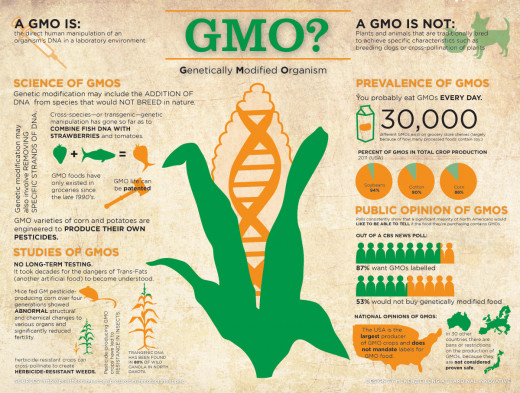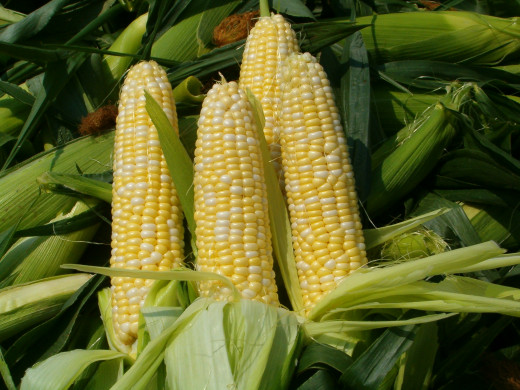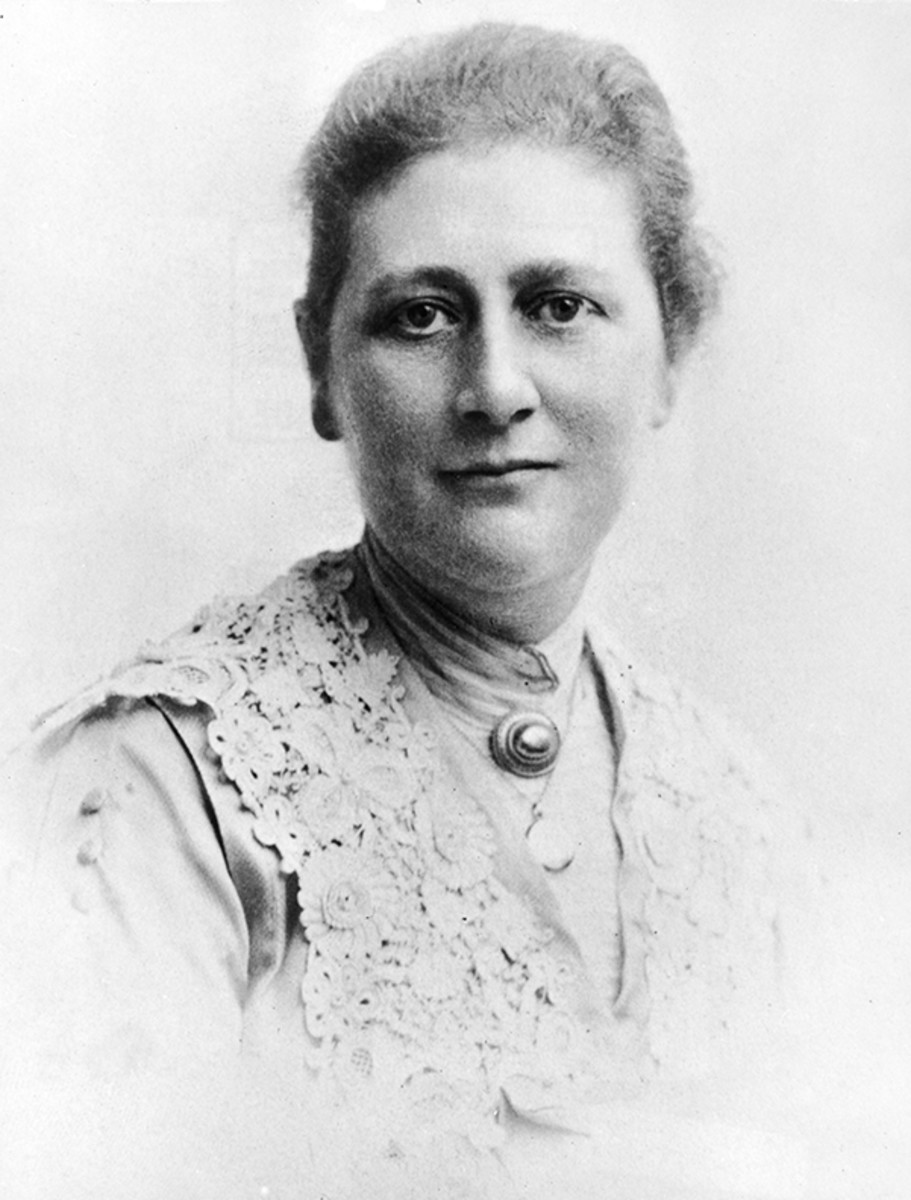Are GMOs bad for you?
GMO?

What are GMOs?
There is a great deal of debate raging on about the safety of eating genetically modified organisms (GMOs). The opponents of GMO foods argue that it is responsible for increases in food allergies, the rise in auto immune diseases and other health problems however there have not been any unbiased research studies that have proven any of this.
The reason foods are genetically modified is to make them resistant to pesticides, make them use less resources to be grown and cultivated, and in some cases even create their own pesticide protection. This ensures that our food supply continues to grow and yield more without further harming the environment.

Intimacy
There are many injustices in the world that can be protested by boycott. Apple computer products are made by Foxconn in China under conditions that cause many employees to commit suicide, but most people are unwilling to give up their technology. Shoes and clothing are often found to be produced under sweatshop conditions overseas and yet sales of these products continue to increase.
The reason it is so easy for many people to quickly demonize GMO foods is that there is a certain intimacy with a product that you put into your body. Whereas production methods overseas don't have a direct impact on an individual that they can see and experience. If someone raises a question about the food we are putting into our own bodies, we are quick to take a step back and heed the warning even if it is not scientifically backed up.
It seems as though there is an imbalance on information available about the safety (or lack there of) concerning GMOs. The Opponents of GMOs have spent a great deal of time and money spreading their message.
(Now I am not a scientist and I haven't conducted any of my own research studies on the subject so I cannot say for certain if a danger exists or not. What I am is a skeptic. I want to hear from both sides and form my own opinion.)

Research
So far very little research has been done on the long term effects of consuming GMOs. A few studies have been done by opponents that in my opinion seemed overly biased. For a true test of the effects it would take a longitudinal study with very strict controls.
All of the health issues that are proposed to have occurred because of GMOs could have a large variety of causes.
Both sides of this argument seem to give very vague scientific backing to their claims. The proponents talk about how the initial biotechnology research is regulated by government organizations including the FDA, USDA, and the EPA. But Effects on humans have not been thoroughly studied.
The opponents conjecture possible effects as if they are proven facts and have taken to making sensationalist claims. The only research that has been done has been on rats and they were feeding some of those rats insecticide in water then grouping the negative results of those fed insecticide with those eating GMOs to "prove" their theories. These tests seem to be subject to experimental bias. Even Michael Hansen, senior scientist at Consumers Union and an expert on GMO research says "that while the new study was longer and better designed than any of the industry GMO safety studies, the sample size — 10 males and 10 females per group — was too small to draw conclusions from."
Read more: http://www.motherearthnews.com/natural-health/gmo-safety-zmgz13amzsto.aspx#ixzz2g8SqrF6
I would like to see tests administered over a longer period where there are more stringent controls on outside variables. These studies should include scientists from both sides of the argument to furnish us with unbiased interpretation of the results.
European Bans of GMOs
Initially it may seem like European countries are banning GMOs based on safety and biodiversity issues. From this stance it seems like the governments are working for consumers best interests.
This is not really the case. Europe's struggling economy is desperate to brand their own agricultural products. If they allow the imports of GMOs from such an agricultural rich country like the US then sales of their own agricultural products will continue to decline. This is a decision they have arrived at for financial and economic reasons. The safety concern is an unproven red herring.
In the end though, this move will actually serve to further cripple their agricultural industries. By refusing to embrace innovations in agriculture they are destroying the land and lowering their crop yields. This will eventually make them develop a need to import more from productive countries like the US. A chief EU scientist states, "In Europe, countries that do not embrace GMOs “will face particular problems with the use of fertilisers, the availability of water and the degradation of soils,” the report warns, noting that improvements in farm yields for major crops have remained “limited or non-existent” in the past decade." (Article provided below)
What Banning GMOs will do to Europe
- Chief EU scientist backs damning report urging GMO ‘rethink’ | EurActiv
The report from EASAC, published in June, warns of the “grave scientific, economic and social consequences of current European Union policy towards GM crops”, saying European countries should “rethink” their widespread rejection of the technology.
Scientist Opinions Videos
Most people have already been inundated with negative videos about GMOs. Below I have a couple videos for the proponent side. Although these videos don't go into a lot of specifics they talk about the fact that before bio-engineering there are requirements from government regulators. It also shows that farmers have been supportive of the products as well.
I have also provided one of the opponent videos to give at least some balance (sorry, that video is an entire program -- 1 hour). The "independent" studies they quote were funded by anti-GMO groups. This is a sensationalist video that admits there hasn't been enough research, yet they make specific claims of what GMOs "do" to humans.
GMO Safety Opinion
Scientists and Farmers support GMOs

Cross Breeding
Bio-engineering is not new. What's new is that it is now done in a lab. In the past human cultures have used cross breeding to create the foods we have today. The opponent video mentioned "organic" corn. Thousands of years ago the Native Americans took a grass plant and cross bred it with a couple different flowering plants to create the corn we know today. Before that time "corn" did not really exist. This is just one example of the many genetic changes in foods that have occurred because of direct human contact.
The invention of Corn
- The Story of Corn - History Detective - In the Beginning
Corn would not exist without direct human contact.

Monsanto's Role
It is easy to blame large corporations and they make a good target for frustrations. I do believe that Monsanto is guilty of ruthless business practices. That I will agree on whole heartily. On the other hand many people are attacking the company solely on the basis that they manufacture GMOs.
Many people like to spout off misinformation like quoting the "Monsanto Protection Act". I am going to tell you right now that this "act" doesn't exist. Anti GMO groups have raised lawsuits against Monsanto based on paperwork irregularities with the USDA because they have no scientific basis for a lawsuit. The rider is actually called the "Farmer Assurance Provision". What this actually does is allow the farmer to continue with their crops while the paper work irregularities are investigated and fixed. This is so these farms don't go out of business.
Opponents argue that it gives Monsanto a protection from prosecution. It does not. It just allows the farmers to continue cultivation during investigation. I have provided the full text of the provision and a link to an article about the provision below.
There is no "Monsanto Protection Act"
- There is no Monsanto Protection Act - Newsroom - Ag Professional
During recent negotiations on the continuing budget resolution, farm state senators included a “Farmer Assurance Provision” rider, which critics have derided as the “Monsanto Protection Act.”
Provision Text
Sec. 735. In the event that a determination of non-regulated status made pursuant to section 411 of the Plant Protection Act is or has been invalidated or vacated, the Secretary of Agriculture shall, notwithstanding any other provision of law, upon request by a farmer, grower, farm operator, or producer, immediately grant temporary permit(s) or temporary deregulation in part, subject to necessary and appropriate conditions consistent with section 411(a) or 412(c) of the Plant Protection Act, which interim conditions shall authorize the movement, introduction, continued cultivation, commercialization and other specifically enumerated activities and requirements, including measures designed to mitigate or minimize potential adverse environmental effects, if any, relevant to the Secretary's evaluation of the petition for non-regulated status, while ensuring that growers or other users are able to move, plant, cultivate, introduce into commerce and carry out other authorized activities in a timely manner: Provided, That all such conditions shall be applicable only for the interim period necessary for the Secretary to complete any required analyses or consultations related to the petition for non-regulated status: Provided further, That nothing in this section shall be construed as limiting the Secretary's authority under section 411, 412 and 414 of the Plant Protection Act.
Conclusion (Purpose for this article)
I didn't write this to sway people away from their stance in this issue. I have just felt that so many people have just jumped on the bandwagon with opponents of GMOs without carefully weighing both sides. My hope is that people reading this will continue to conduct their own research and notice the flaws in both side's arguments. It is up to you to learn about an issue before you form an opinion.
Bottom line is that neither side have significant scientific research to back their claims. Neither side can claim that they are right. Just remember that it has been in our human nature to adapt the world to us rather than the other way around. GMOs are not new. We have been consuming foods that have had direct changes made to them by humans since birth whether you were aware of it or not. If you want to hate Monsanto, I suggest you do it over their ruthless business practices and not because of the products they sell.







